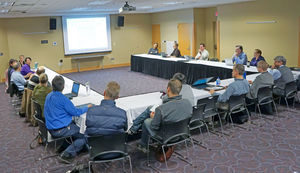This story was written by Quintin Ellison, originally published in The Sylva Herald.

WCU Faculty Senate met Feb. 3 to approve a resolution condemning the travel ban. Photo by Quintin Ellison.
Faculty and student leaders at Western Carolina University condemned President Donald Trump’s immigration order as “fundamentally antithetical to the values and goals of higher education and to American values as a whole.”
Meeting Feb. 3, Faculty Senate members voted to approve a resolution opposing the president’s Jan. 27 ban on travelers from seven Muslim-majority countries. This week, the Student Government Association followed suit. Staff Senate members planned to discuss the resolution Wednesday, after press time.
Trump’s executive order is “hostile to the goals of higher education and fails to promote civility and humanity, which we strive to cultivate in our campus community,” the resolution states. “It also restricts our ability to attract and support international students and scholars, which is central in our university’s culture, mission and strategic plan.”
The White House contends the travel ban is critical to national security. “We want to make sure we are not admitting into our country the very threats our soldiers are fighting overseas,” the president said in signing the order. This week, Trump characterized his action as “common sense.” He promised, if necessary, to fight for the ban, to the U.S. Supreme Court. At press time Wednesday, the order remained in legal stasis.
Some WCU faculty felt the University of North Carolina system and WCU Chancellor David Belcher failed to repudiate the president’s ban in strong-enough terms, Faculty Senate Chairman Bill Yang said.
After Trump enacted the measure, university officials sent a campus-wide email saying WCU “values highly our international students, faculty and staff as important members of our campus community and is committed to being a welcoming and inclusive community for all.”
Wes Stone, interim head for WCU’s department of engineering and technology, said there are faculty, undergraduate and graduate students who are afraid to visit their home countries.
“We’re looking at people who are going to have to stay here for an extended period of time before they can go, because they may fear that they can’t come back,” he said. “I have a friend who, after 9/11, was teaching at a university, and he went home to China. He was never able to come back. He had to abandon his apartment, his job. I think this is a hasty act, and I’d love to see it revoked.”
WCU administrators say they believe a few people only on campus fall directly under the executive order. There are two graduate students from Iran, one faculty member from Iran and one faculty member from Libya. Additionally, WCU has an academic administrator with dual citizenship in the United States and Iran.
WCU will abide by federal and state laws prohibiting the release of confidential information about students, faculty or staff, university spokesman Bill Studenc said last week.
– – – – –
Western Carolina University joined 598 other colleges and universities in sending a letter to the U.S. Department of Homeland Security about President Donald Trump’s executive order. The letter was addressed to Secretary John Kelly. Here’s what WCU administrators told the Herald:
“The university agrees with the letter’s concerns about the executive order and with its expression of support for the need to safeguard our nation while also welcoming international students, faculty, researchers and staff to our campus.
“We concur that our national leadership should develop policies that protect our people from those who would do us harm without hampering the scientific and technological advances that are made possible by international scholars and researchers.”
The American Council on Education circulated the letter.
– – – – –
A previous story from The Sylva Herald discussed how the executive order might impact WCU’s campus and community members. A WCJ story published Feb. 9 also looked at the order’s impact and how it could redefine the American Dream.


